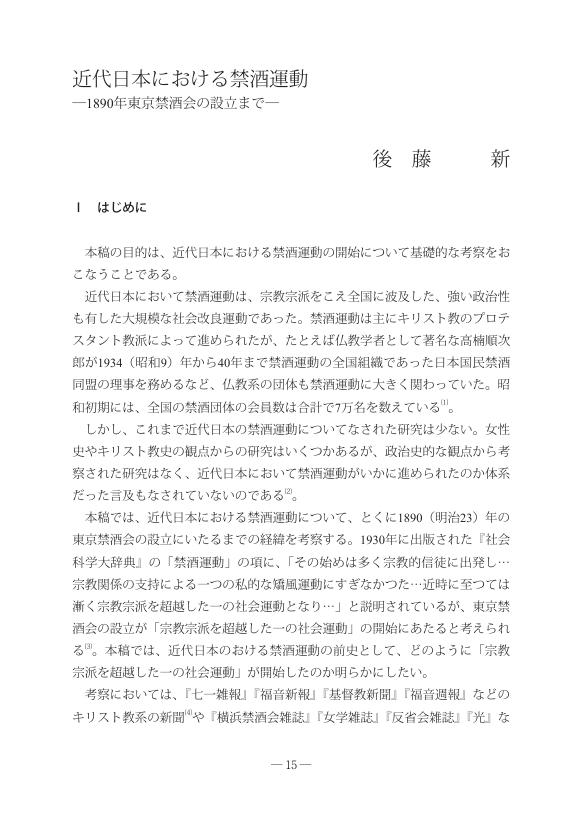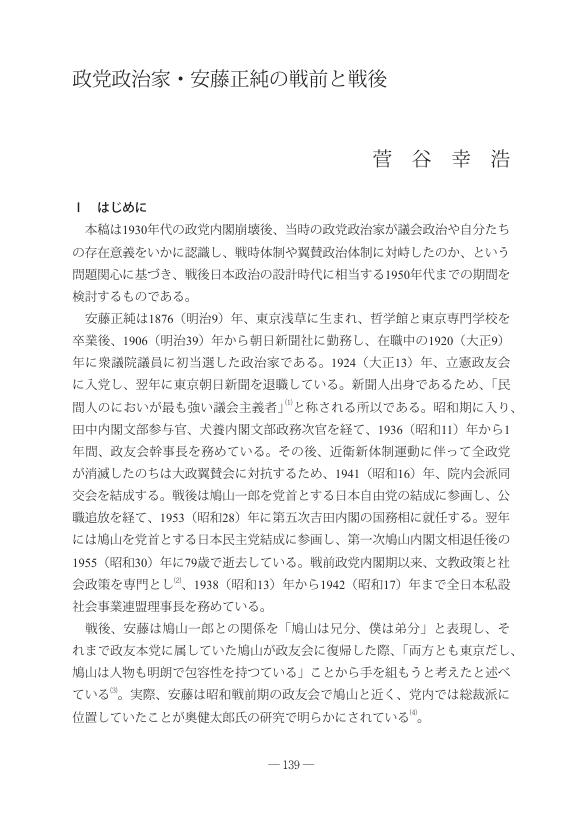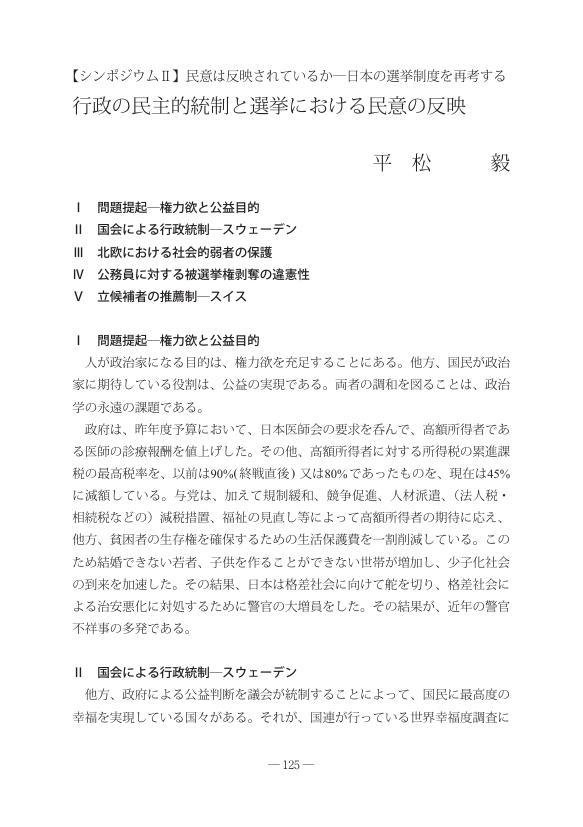4 0 0 0 OA 常居国による無国籍者の権利保障について : 常居国に居住する権利を中心に
- 著者
- 付 月
- 出版者
- 日本法政学会
- 雑誌
- 法政論叢 (ISSN:03865266)
- 巻号頁・発行日
- vol.44, no.2, pp.1-12, 2008-05-15
Stateless person, who lack a legal bond of a nationality which has been described as "the right to have rights", exist in all regions of the world. Japan is not an exception from this phenomenon. Some person are turned "stateless" due to political or historical reasons, and many new born stateless children of foreign parents are living in the shadows of the Japanese society. The most effective way of protecting stateless persons, according to the United Nations High Commissioner for Refugees (UNHCR), is to develop legislation that avoids creating a situation of statelessness in the first place. However, it is estimated that there are about 15 million stateless persons in the world who should be protected until the problem of statelessness is eliminated. Ensuring the right of stateless persons to remain in their country of habitual residence is indispensable for the protection of stateless persons. Nevertheless, many stateless persons are confronted with a danger of expulsion and detention in the country of their habitual residence despite the fact that they lack of protection by any state in the world. This article focuses on the issues of protecting stateless persons, especially on the rights to remain and re-enter the country of their habitual residence, and on the protection against expulsion and detention of stateless persons. I drew particular attention to analyze the actual situation of the deportation and detention of stateless persons who are irregularly staying in Japan.
3 0 0 0 OA 近代日本における禁酒運動 ─1890年東京禁酒会の設立まで─
- 著者
- 後藤 新
- 出版者
- 日本法政学会
- 雑誌
- 法政論叢 (ISSN:03865266)
- 巻号頁・発行日
- vol.55, no.1, pp.15, 2019 (Released:2019-04-08)
3 0 0 0 OA 累犯性性犯罪者に対する特別法の制定に関する研究
- 著者
- 西山 智之
- 出版者
- 日本法政学会
- 雑誌
- 法政論叢 (ISSN:03865266)
- 巻号頁・発行日
- vol.51, no.2, pp.131-145, 2015-08-15 (Released:2017-11-01)
Sex crime is a serious problem. It causes mental pain for victims and social unrest. GPS monitoring and the official information disclosure system have become famous topics of discussion in Japan in the last few years. In this paper I raise three points that have yet to be discussed in this context: (1) a sex offender has a mental illness, requiring special treatment; (2) the judicial system needs a system for investigating an accused's individual traits in court to facilitate correctional treatment; (3) a period for the treatment of sex offenders in penal institutions must be ensured. In this paper, I mention a controversial mental disease called sex addiction and point out possible methods for treating sex offenders. Finally I discuss a new criminal justice system in Japan for repeat sex offenders and propose four ideas: (1) a system for pre-sentencing investigation, (2) treatment advice from judges, (3) a treatment system in penal institutions that allots ample time for the treatment of illness, (4) the assurance of enough time before probation.
- 著者
- 村岡 敬明
- 出版者
- 日本法政学会
- 雑誌
- 法政論叢 (ISSN:03865266)
- 巻号頁・発行日
- vol.56, no.2, pp.1, 2020 (Released:2021-01-20)
- 著者
- 桶本 秀和
- 出版者
- 日本法政学会
- 雑誌
- 法政論叢 (ISSN:03865266)
- 巻号頁・発行日
- vol.55, no.2, 2019
3 0 0 0 OA 殺人罪と保護責任者遺棄致死罪の区別 : わが国の判例の分析を中心に
- 著者
- 萩野 貴史
- 出版者
- 日本法政学会
- 雑誌
- 法政論叢 (ISSN:03865266)
- 巻号頁・発行日
- vol.52, no.1, pp.103-121, 2016-02-25 (Released:2017-11-01)
With which crime should be charged, for example, against the parents who have caused the death of their child through negligence? As a regulation related to this act, the following is considered. First, in Japanese criminal law, Article 218 (Abandonment by the Person Who Is Responsible for Protection) provides that "when a person who is responsible for protection of the immature..., fails to give necessary protection to such person, the person shall be punished..." Moreover, when the victim suffered death or injury, abandonment causing death or injury (Article 219) is charged against the person. On the other hand, Article 199 (Homicide) provides that "a person who kills another shall be punished...", and, according to a prevailing view, is applied murder by omission. In the above-mentioned case, there are the precedents judged either as homicide or as abandonment against the acts causing death by neglecting the victims. Then, what is the standard to classify these 2 crimes? This study is to provide perspective view to the standard through a consideration of the related precedents.
3 0 0 0 OA 政党政治家・安藤正純の戦前と戦後
- 著者
- 菅谷 幸浩
- 出版者
- 日本法政学会
- 雑誌
- 法政論叢 (ISSN:03865266)
- 巻号頁・発行日
- vol.54, no.2, pp.139, 2018 (Released:2018-09-27)
3 0 0 0 OA 最高裁判所裁判官国民審査制度の法文化論的考察
- 著者
- 岸本 正司
- 出版者
- 日本法政学会
- 雑誌
- 日本法政学会法政論叢 (ISSN:03865266)
- 巻号頁・発行日
- vol.33, pp.111-132, 1997-05-15
1. Introduction I remarked the reason why I selected the theme, and the necessity of considering the system legally and culturally, which is described from a different point of view comparing with other postwar treatises on the Constitution of Japan. 2. The purpose, nature, and problems of this sytem I calssified some main interpretations of the Constituton focussing on the system. And then I showed the limitations of postwar explanations for consistency between the system and Japanese society's condition. Plus I wrote I and other specialists could not present a significant vision for the future from the postwar viewpoints. 3. The Judical Precedents of the Review of the Supreme Court I analized the precedent of the Supreme Court in 1952. And I looked over the background of the precedent which states the system of the review of the Supreme Court is that of recall. 4. The Origin of the system and the Revision from Japanese Conception I investigated throughly the process in which the legal system was added into the Constitution for the first time. And I researched into the reason why the original model of the review system has been changed into the present one. 5. Conclusion In conclusion, I specified three main points of legal culture or conception in Japan, which come from Japanese mentality. Second, I examined both the theory for retaining the system and that for abolishing the system. Finally, I concluded that the system should be abolished after these considerations.
- 著者
- 福沢 真一
- 出版者
- 日本法政学会
- 雑誌
- 法政論叢 (ISSN:03865266)
- 巻号頁・発行日
- vol.45, no.2, pp.109-119, 2009-05-15
By the progress of urbanization in Japan, city planning systems were introduced from Europe and America. In this Process, many cities pointed out the problem of imperfect cooperation between building control by police and city planning. On this point, this paper argues about the discussion in the "National City Planning Conference" in the Showa Period.
2 0 0 0 OA イギリスの刑事責任年齢の変遷と展望
- 著者
- 増田 義幸
- 出版者
- 日本法政学会
- 雑誌
- 法政論叢 (ISSN:03865266)
- 巻号頁・発行日
- vol.55, no.1, pp.29, 2019 (Released:2019-04-08)
2 0 0 0 OA ジュゴン訴訟の法的意義 ―動物裁判の新展開と手続的統制の意義―
- 著者
- 大林 啓吾
- 出版者
- 日本法政学会
- 雑誌
- 法政論叢 (ISSN:03865266)
- 巻号頁・発行日
- vol.51, no.1, pp.147, 2014 (Released:2017-11-01)
2 0 0 0 OA 水俣病多発地域における漁家世帯の階層移動と 克服への究明
- 著者
- 三好 禎之
- 出版者
- 日本法政学会
- 雑誌
- 法政論叢 (ISSN:03865266)
- 巻号頁・発行日
- vol.53, no.1, pp.201, 2017 (Released:2017-05-19)
Overview After 1956, when Minamata disease was officially acknowledged, interdisciplinary research was developed that included epidemiology, sociology, ethnology, and social welfare. However, longitudinally and cross-sectionally qualitative research into how the lives of Minamata disease victims have been damaged by pollution remains scarce. Furthermore, qualitative research that has explored social stratum movements of Minamata disease victims has thus far yet to be undertaken, and the actual situation is unclear. Against this background, the present study has sought to elucidate social stratum movements of fishery households through an exploratory approach, and investigates how they have overcome having their lives destroyed, and how they have escaped from a state of worsening poverty. The study also examines how legislation and policy have contributed to the lives of Minamata disease victims.
2 0 0 0 OA ネット上の不特定多数者に対する情報発信についてのブランデンバーグテストの批判的考察
- 著者
- 辻 雄一郎
- 出版者
- 日本法政学会
- 雑誌
- 法政論叢 (ISSN:03865266)
- 巻号頁・発行日
- vol.46, no.1, pp.108-137, 2009-11-15 (Released:2017-11-01)
In the United States, the Brandenburg test has been applied to the incitement of the illegal action in the physical world. In this paper, the author asks whether this Brandenburg test is applicable in the internet. Cyberspace has several special factors which do not exist in the physical world. Everyone can be the speaker at a cheap price. The message is sent all over the world instantly. This convenient tool has dark sides such as email bombs, and intimidation homepages. In the internet age, we need to ask the question whether the Brandenburg test is modified or abolished totally in this information society because of these special features of the internet. There are various tools to send messages via internet such as e-mail, homepage, blog, newsletter, mailing list, etc. In this paper, the author focuses just on the expression opened to the public. The author believes that before seeing the internet problem, it is necessary for us to see the origin and applicability of the Brandenburg test in the physical world. The Brandenburg test is not a given. Its origin is clear and the present danger test shaped in common law. In the conclusion, the author suggests that the Brandenburg test has some future since it has been used to protect the opinion of the minority in the real world. However, this test was used mostly in the peaceful period. We need to be vigilant to see this test for internet society.
2 0 0 0 OA 黒龍会・内田良平の同光会活動
- 著者
- 山之口 公一
- 出版者
- 日本法政学会
- 雑誌
- 法政論叢 (ISSN:03865266)
- 巻号頁・発行日
- vol.32, pp.155-165, 1996-05-15 (Released:2017-11-01)
In the 1920's, the governmental policy for Korea by Makoto Saito, a new governor, under the Hara Cabinet is called the "Budan Seiji"(culture based government) as compared with the former "Bunka Seiji" (military government). It's needless to say the anti-Japanese movement became more and more serious since the San-Ichi movement and this caused the change of policy. The government general adopted the concrete policies, one of which was to take advantages of the pro-Japanese groups in Korea by supporting and protecting them. Though the policy wasn't discussed in public, the authorities knew it was an urgent and important task. It is said that the Japanese government and the government general made the Koreans organize various pro-Japanese groups and gave an indirect aid to them, but those groups were actually controlled by the Japanese behind them. Under the situation, however, on Feb.3 in 1921, the Dokokai was established by Ryohei Uchida, the chief of the Kokuryukai, and it should be noticed that they neither received instructions nor intentions from the government general. As the only independent organization, the Dokokai concentrated new and old foreign uncompromising elements including masterless samurais living in the continent, and started to criticize severely against the government general. Here, in this paper, I refer to the study of the procedure of the establishment of the Dokokai, and the investigation of the actual conditions of the activities by Uchida and his Kokuryukai in the second half of Taisyo era.
2 0 0 0 OA 行政の民主的統制と選挙における民意の反映
- 著者
- 平松 毅
- 出版者
- 日本法政学会
- 雑誌
- 法政論叢 (ISSN:03865266)
- 巻号頁・発行日
- vol.56, no.1, pp.125, 2020 (Released:2020-06-22)
2 0 0 0 児童虐待に対する刑事法の新たな役割
- 著者
- 三枝 有
- 出版者
- 日本法政学会
- 雑誌
- 法政論叢 (ISSN:03865266)
- 巻号頁・発行日
- vol.40, no.1, pp.66-78, 2003
The act of child abuse is often performed by the protector of the abused child under the veil of "discipline", so the abuser does not have the strong sense of guilt, nor is the abused conscious of the fact that he or she is the target of a crime. That is why child abuse is called "a hidden crime". Most of the acts of child abuse are performed behind closed doors and continue for a certain period of time. In most cases such acts are not discovered by an outsider easily. Moreover the act of child abuse is performed between the special relationship such as the relationship of a parent and a child, so that it is difficult for the abused children to recognize themselves as a victim and the children tend to be resigned to their situation. Not only that, the abused children often form the sense of guilt because they feel they are also responsible for such an act. In 1961 C.H. Kempe advocated "the Battered-Child Syndrome" concerning the actual conditions of child abuse which has the special characteristic of a hidden crime. Nearly 40 years later, finally in Japan, "the Law concerning the Prevention and Others of Child Abuse (the Child Abuse Prevention Law)" was passed and effected at the plenary session of the House of Representatives on May 17, 2000. Since the enforcement of the Law, the number of acknowledged cases of child abuse and the number of arrests have been increasing rapidly, so it is true that the very enactment of the Law has promoted the notifications of child abuse cases and the arrests of abusers. It is also true that in the Japanese society where Confucian ideas still remain in people's mind, like in Korea, child abuse by its own parent was a taboo which we should not talk about or even think about. However, realities were opposite. In this paper, I will discuss the role that criminal punishment should play to prevent child abuse, while grasping the actual conditions of child abuse today and the Japanese ideas that have led to such conditions. As a conclusion I would like to propose the active introduction of punitive provisions of the laws by demonstrating that conventional punishment which emphasizes its function of sanction should emphasize its function of forming the new sense of norms in child abuse and furthermore that punishment should actively perform its supplementary function to facilitate welfare-oriented intervention by the government going beyond its general preventive function. Contents 1. Introduction-Actual Conditions of Child Abuse 2. The Abuse Prevention Law and Punishment 3. The Role of the Criminal Law in Child Abuse 4. Conclusion-the New Function of the Criminal Law
2 0 0 0 ホームレス支援における「みまもり」の意義:─権利擁護の観点から─
- 著者
- 砂脇 恵
- 出版者
- 日本法政学会
- 雑誌
- 法政論叢 (ISSN:03865266)
- 巻号頁・発行日
- vol.54, no.2, 2018
- 著者
- 東 裕
- 出版者
- 日本法政学会
- 雑誌
- 法政論叢 (ISSN:03865266)
- 巻号頁・発行日
- vol.52, no.1, pp.231-251, 2016-02-25 (Released:2017-11-01)
- 被引用文献数
- 2
The Constitution of Japan, which was made in occupied Japan in 1946, has no provisions for emergency powers. A number of constitutional lawyers have argued about the intention of the absence or luck of them since around 1956. Many of them appreciate the absence or luck of emergency power clauses positively and share the recognition that emergency power provisions in the constitution is naturally incompatible with the constitutionalism. On the other hand, in the arena of practical politics, it has been considered indispensable to the state to have legislation enabling the government to take emergency measures at the time of crisis since Japan restored its sovereignty and independence in 1952. But some laws relating to a state of emergency or crisis have been criticized unconstitutional by many constitutional lawyers. In 2012, Japanese ruling party LDP published the draft of an amendment to Constitution of Japan including the provisions for emergency powers. Coming up this draft, it is no more fruitful to argue why the Constitution has not provisions for emergency powers and researching its meaning. A new stage is coming to a discussion of an emergency power. Now it must be considered how the emergency powers should be provided in the coming revised Constitution of Japan. This article examines that how an emergency power has been discussed in Japan and proposes the necessity of introducing it into the Constitution.
2 0 0 0 OA 西園寺公望のシラス論批判に関する一考察
- 著者
- 髙澤 弘明
- 出版者
- 日本法政学会
- 雑誌
- 法政論叢 (ISSN:03865266)
- 巻号頁・発行日
- vol.50, no.2, pp.79, 2014 (Released:2017-11-01)
2 0 0 0 OA 国際関係史から見た万国博覧会 : 一九〇四年セントルイス万国博覧会を中心に
- 著者
- 楠元 町子
- 出版者
- 日本法政学会
- 雑誌
- 法政論叢 (ISSN:03865266)
- 巻号頁・発行日
- vol.43, no.2, pp.22-38, 2007-05-15
Ever since the first Expo held in London, England, 1851, Expo has provided a strong reflection of the international relationships of its time. Usually, it is the culture presented at Expo that is regarded, but this paper will look further and consider the history of international relationships that Expo demonstrates, focusing on the Expo of 1904 held in St. Louis of the United States of America, which occurred during the time of the Russo-Japanese War. Using information gathered from the St. Louis public library, Japanese diplomatic data, and other various resources, this paper will analyze aspects of the United States of America, the country in which the Expo of 1904 was held; Japan, who joined the Expo in an effort to gain favorable public opinion from the American people! China, who, for the first time, formally sent an Imperial family member as a delegate! and Russia, whose government decided to not participate. This paper will consider the diplomatic strategies of these four countries, clarifying the influence that Expo has had on international relationships. A Japanese diplomat and a public relations representative for the Imperial family who visited the Expo in St. Louis announced that Japan was following Western countries by adapting to and introducing systems of modernization, which clearly showed that Japan had different policies compared with China, Asia's great nation. America overwhelmed the other countries with a display of great technical skill and power, and with its "Philippine Village" exhibit appealed to justify America's policy of colonization. On the other hand, a display that arrived late and conflicts experienced between the members of the exhibition company attested to Russia's domestic, political, and economic confusion and disorder to the world.









